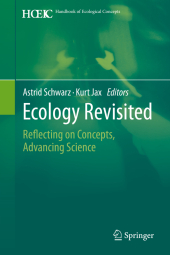 Neuerscheinungen 2014Stand: 2020-02-01 |
Schnellsuche
ISBN/Stichwort/Autor
|
Herderstraße 10
10625 Berlin
Tel.: 030 315 714 16
Fax 030 315 714 14
info@buchspektrum.de |

Kurt Jax, Astrid Schwarz
(Beteiligte)
Ecology Revisited
Reflecting on Concepts, Advancing Science
Herausgegeben von Schwarz, Astrid; Jax, Kurt
2011. 2014. xix, 444 S. 235 mm
Verlag/Jahr: SPRINGER NETHERLANDS; SPRINGER 2014
ISBN: 9400797389 (9400797389)
Neue ISBN: 978-9400797383 (9789400797383)
Preis und Lieferzeit: Bitte klicken
This is an international, interdisciplinary work of reference in the field of ecology and environmental studies. It tells the story of the history of the concept of ecology and adds to the historical and philosophical debate over this multifaceted discipline.
As concerns about humankind´s relationship with the environment move inexorably up the agenda, this volume tells the story of the history of the concept of ecology itself and adds much to the historical and philosophical debate over this multifaceted discipline. The text provides readers with an overview of the theoretical, institutional and historical formation of ecological knowledge. The varied local conditions of early ecology are considered in detail, while epistemological problems that lie on the borders of ecology, such as disunity and complexity, are discussed. The book traces the various phases of the history of the concept of ecology itself, from its 19 th century origins and antecedents, through the emergence of the environmental movement in the later 20 th century, to the future, and how ecology might be located in the environmental science framework of the 21 st century.
The study of ´ecological´ phenomena has never been confined solely to the work of researchers who consider themselves ecologists. It is rather a field of knowledge in which a plurality of practices, concepts and theories are developed. Thus, there exist numerous disciplinary subdivisions and research programmes within the field, the boundaries of which remain blurred. As a consequence, the deliberation to adequately identify the ecological field of knowledge, its epistemic and institutional setting, is still going on. This will be of central importance not only in locating ecology in the frame of 21 st century environmental sciences but also for a better understanding of how nature and culture are intertwined in debates about pressing problems, such as climate change, the protection of species diversity, or the management of renewable resources.


